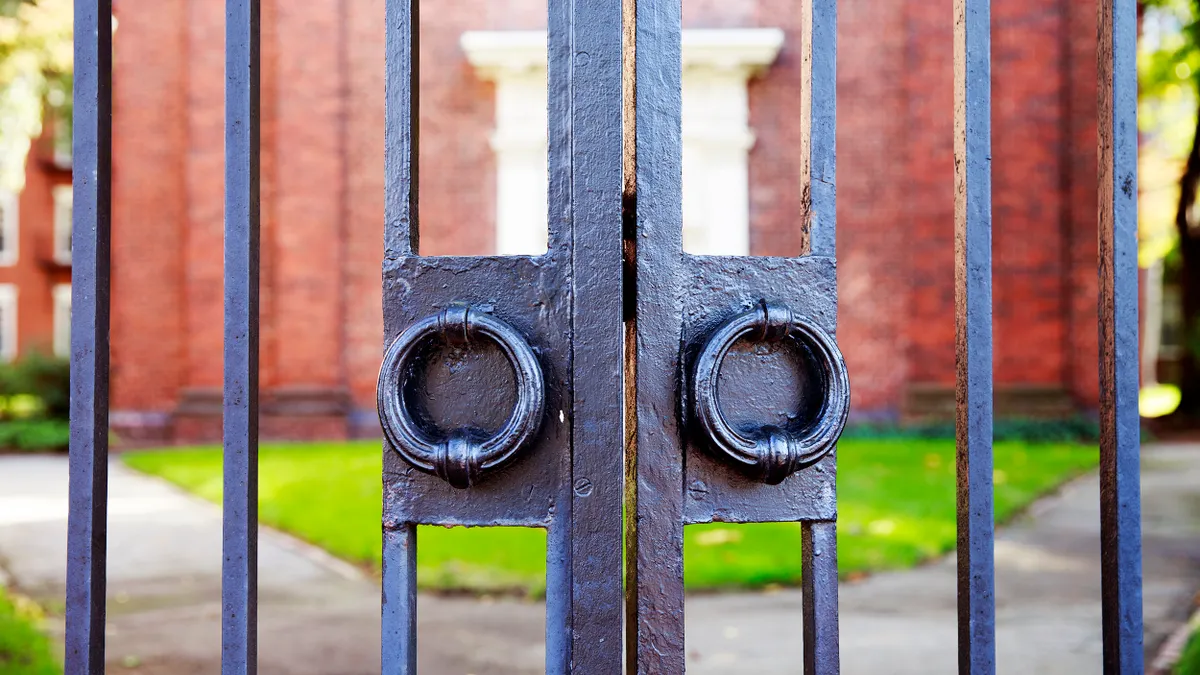Dive Brief:
- Campus groups that advise the governing board of Mississippi's public colleges on which presidential candidates to select will now be secret — even among their own members.
- That’s the new policy the Mississippi State Institutions of Higher Learning's board of trustees approved this month. Search Advisory Constituency groups, which are composed of no more than 15 individuals representative of a university campus, provide feedback on presidential contenders, but their members will not know who each other are.
- The board is not required to create the search advisory groups, but experts still say the change makes the hunt for new presidents opaque — opening them up to conflicts of interest and possibly undermining faculty-administrative relationships. It comes at a time when institutions across the U.S. are increasingly choosing not to share candidates' identities, adopting a process known as a closed search.
Dive Insight:
Closed searches have proliferated in higher education in recent years, particularly among private colleges — about three-fifths of which employ them, according to recent American Association of University Professors research.
About one-fourth of public colleges use closed searches, the AAUP found. But that share is likely rising. Florida, for instance, passed a law last month requiring the names of presidential hopefuls for all public colleges to remain secret until a search's final stages.
Defenders of closed searches say they ensure candidates don't jeopardize their current employment if they make known they’re seeking another job.
Researchers have never unearthed evidence that applying for another position resulted in a president's firing. Often, provisions built into chief executives' contracts promise them extensive perks if they're terminated without cause.
But fallout can still occur. In March 2018, Matthew Wilson, then-president of the University of Akron, in Ohio, lost out on the top job at the University of Central Florida, which made candidates' names public.
U of Akron’s governing board didn't reprimand Wilson, but his pursuit of the presidency generated backlash, and he ultimately stepped down later that year.
Identities of presidential applicants to Mississippi public colleges were already confidential, board spokesperson Caron Blanton said in an email.
However, the changes to advisory committees are unheard of in search processes, said Judith Wilde, a research professor at George Mason University who has studied presidential searches extensively.
Having anonymous advisers undermines shared governance and the tradition of allowing individuals on campus to weigh in on their leader, Wilde said. She likened the level of secrecy to that typically seen among federal security agencies like the FBI and CIA.
"I can't think of any benefit this has at all," Wilde said.
New board policy also permits trustees to invite individuals to interview even if they have not applied or expressed interest in the position. Taken together with the secret advisory committee, these rules have the potential to create conflicts of interest, Wilde said.
Blanton said the board wants advisory group members "to provide independent and confidential advice" without consulting other members. Blanton did not explain why the board does not want members speaking with one another.
The board's public agenda states that it discussed the change extensively at its March meeting.
Typically, a recording of meetings is posted online, but in March the board met not at its home office but at Mississippi State University. Meeting off-site means the board is not always capable of recording meetings, Blanton said.
The policy states that the board will approve members of the search advisory group that "shall be representative of the various constituent groups of the university and representative in terms of diversity."
Names of those board members will not be shared with each other and they will never meet, according to the policy. Members will be provided with a questionnaire they will fill out to give feedback on candidates.
Those opinions will be consolidated into a report for the board's presidential search committee. Blanton did not respond to a question about whether the advisory committee members will meet applicants.
Mississippi has eight public four-year universities. Only one, the University of Southern Mississippi, is currently searching for a leader, as the president, Rodney Bennett, will step down in 2023.















